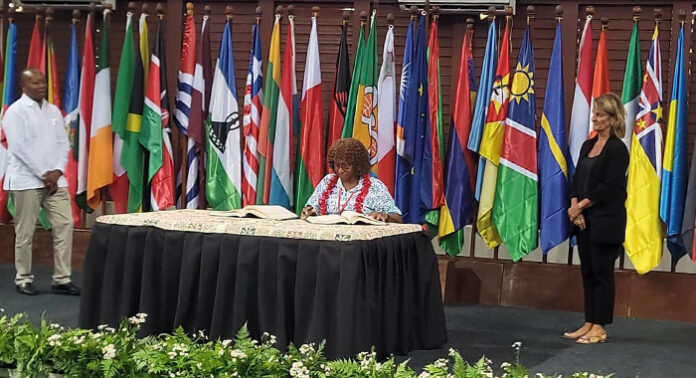St. Vincent and the Grenadines Signs Controversial EU Deal Amid Concerns Over Abortion and LGBTQ+ Impositions
“The cleric emphasized that due to the document’s signing, there would be a requirement to implement abortion legislation, transgender, LBGTQ, comprehensive sex education, and a spectrum of values.”
Andrea Bowman, the SVG Ambassador to Taiwan, signed a partnership agreement in Samoa on behalf of Kingstown, part of a new Samoa Agreement between the European Union (EU) and the Organisation of African, Caribbean, and Pacific States (OACPS). This 20-year deal replaces the Cotonou Agreement and covers sustainable development, human rights, and security, but has raised concerns due to its potential imposition of abortion legislation and LGBTQ+ values.
Critics like Roman Catholic Archbishop Jason Gordon of Port of Spain in Trinidad express worries, stating that signing the agreement could force participating nations to adopt values and laws contrary to their own cultures. Notably, Trinidad and Tobago, Jamaica, and Namibia, members of the OACPS, haven’t signed.
Archbishop Gordon emphasizes the EU’s imposition of ideologies and values, cautioning smaller Caribbean states against succumbing to this influence. He lauds governments like Trinidad and Tobago and Jamaica for resisting the agreement.
SVG’s involvement comes amid legal considerations regarding colonial-era laws criminalizing same-sex relations. Similar legal challenges have been unsuccessful in other Commonwealth Caribbean countries.
The Samoa Agreement has faced opposition from conservative groups like Christian Council International (CCI), highlighting its demands that conflict with traditional moral values. They advocate for parliamentary approval in each OACPS country before finalizing the agreement.
Georges Chikoti, Secretary General of the OACPS, emphasizes the agreement’s provisions for regular review and increased involvement of non-state actors. The agreement outlines common principles covering various areas from human rights to environmental sustainability and includes three regional protocols tailored to Africa, the Caribbean, and the Pacific.
This partnership, involving 27 EU member states and 79 ACP countries, aims to address global challenges like climate change and migration.
Source: iWitness News


